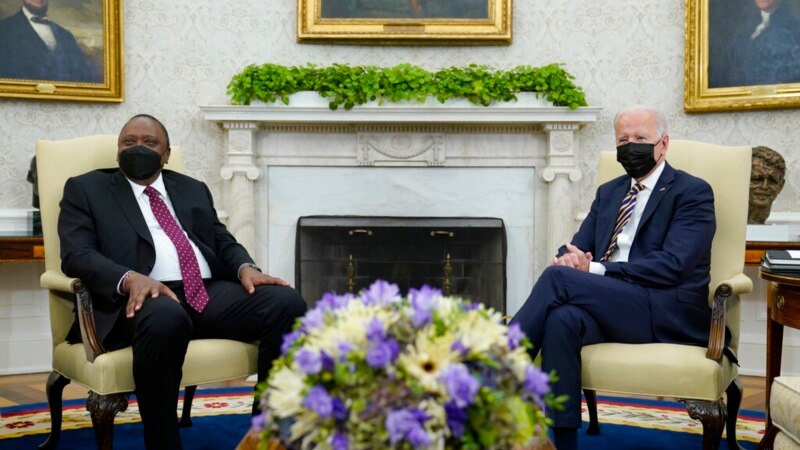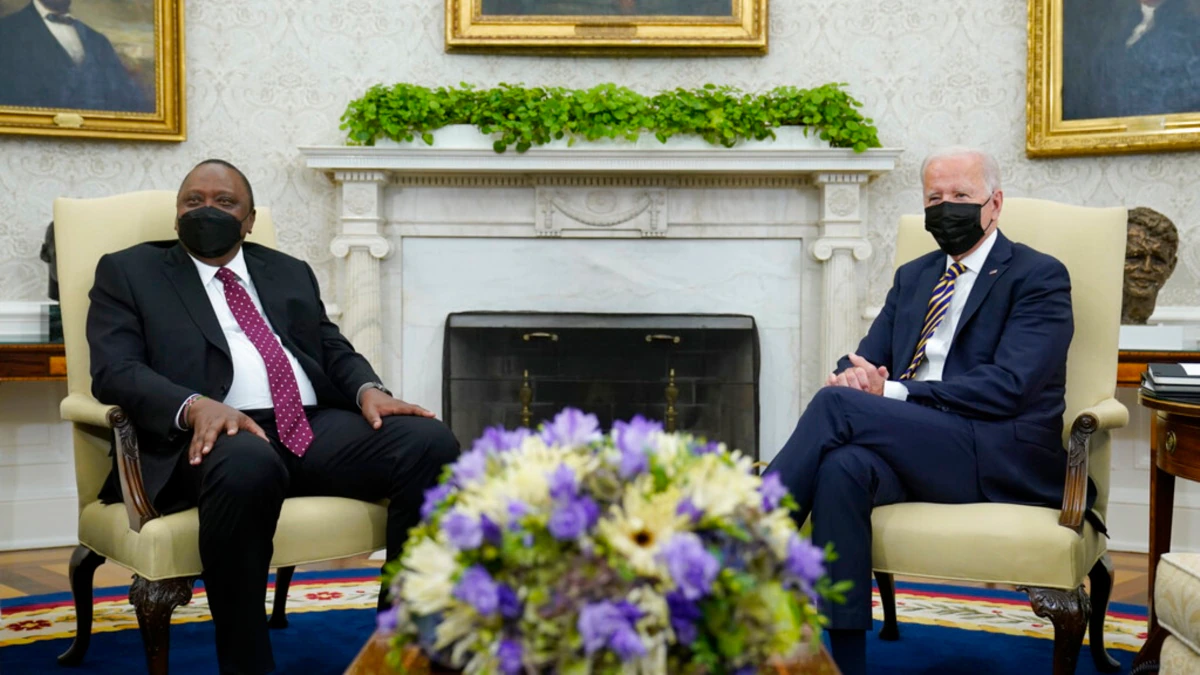
Kenya is a major African player on the world geopolitical stage — as evidenced by U.S. President Joe Biden’s decision to meet with Kenyan President Uhuru Kenyatta on Thursday, Biden’s first in-person talks with an African leader since becoming president.
“The U.S.-Kenya strategic partnership is essential,” Biden said, as the two leaders sat down in the Oval Office. “We both, I think, believe it is essential to addressing key regional and global challenges,” he said.
After the meeting, the White House said the pair “discussed their shared commitment to defending democracy and human rights, advancing regional peace and security, and accelerating economic prosperity through climate-smart solutions and the use of renewable energy resources.”
The White House also said, in that statement, that the two “underscored the need to bring additional transparency and accountability to domestic and international financial systems and to advance peaceful resolutions to the conflicts in Somalia and Ethiopia.”
In Kenya’s next-door neighbor, Ethiopia, war has raged in the northern Tigray region for nearly a year. The conflict has killed untold numbers of people — the death toll itself is a subject of contention. The United Nations estimates the war has plunged 5.2 million people into a humanitarian crisis and sent more than 63,000 fleeing into neighboring Sudan.
“Today, we’re going to discuss what more Kenya and the United States can do together on the Horn of Africa to advance peace and security,” Biden said during the public opportunity before the closed-door meeting. Neither leader mentioned Ethiopia by name.
White House Press Secretary Jen Psaki, however, said the two leaders had discussed the landlocked nation and described the conflict in stark terms.
Biden last month signed an executive order threatening to impose sanctions on “those responsible for, or complicit in, prolonging the conflict in Ethiopia, obstructing humanitarian access, or preventing a ceasefire.” The sanctions, which have not yet been imposed, would affect the Tigray People’s Liberation Front, the federal governments of Ethiopia and Eritrea, the Amhara regional government, and other parties in the conflict.
“Obviously, what’s happening in Ethiopia, it’s an atrocity,” Psaki said, responding to a question about when the United States would initiate sanctions. “It’s horrific. It’s something that, frankly, I’m happy you’re asking about because there hasn’t been probably enough attention here in the United States to what’s happening.”
African solutions to African problems?
The lack of international oversight over the conflict, both in Tigray and in Addis Ababa, is a concern. In September, Ethiopia expelled seven senior United Nations officials, indicating that the Horn of Africa power is not easily influenced by outside forces. As Ethiopian leaders and ordinary citizens are inclined to note, Ethiopia is the only African nation that has never been colonized.
That historic mistrust, said Fergus Kell, an analyst with British research organization Chatham House, makes a fellow African state like Kenya a smart choice to exert influence.
“Regionally, Kenya has been a long-standing partner of the U.S. in terms of counterterrorism, particularly with respect to Somalia,” said Kell, speaking from Kano, Nigeria. “But increasingly, this is also about the situation in Ethiopia. As the Biden administration weighs up stronger punitive measures, Kenya has been one of the most vocal African countries on the crisis.”
This week, Kenyatta told reporters at the United Nations that the warring sides in Ethiopia must reach “a political resolution, because we do not believe that there is any military solution.”
‘I want to talk to you about that’
The White House also said the leaders discussed democracy and human rights issues as well security, economic growth, climate change and “the need to bring transparency and accountability to domestic and international financial systems.”
The last subject is likely to touch on revelations about Kenyatta and his family’s offshore holdings. The International Consortium of Investigative Journalists said in its recent Pandora Papers reports that Kenyatta’s family had stowed away about $30 million in offshore wealth. There is no evidence that the Kenyatta family stole any state assets.
When asked by VOA on Wednesday about the push for transparency and the Pandora Papers revelations, Psaki said Biden “has been quite vocal, as you all know, about the inequalities in the international financial system.”
“That doesn’t mean we don’t meet with people you have disagreements on,” she said. “We have a range of interests in working with Kenya and working with them on issues in Africa, in the region, and that will be the primary focus.”
Biden said Thursday he planned to discuss the issue with his Kenyan counterpart in private.
“We’re also going to talk about strengthening financial transparency and accelerating economic growth,” Biden said, as the two smiled and reclined in armchairs near artwork depicting American civil rights champions Martin Luther King, Jr. and Robert F. Kennedy.
“You’ve spoken to that, Mr. President; I want to talk to you about that,” Biden added.
VOA’s Chris Hannas contributed to this report.













































